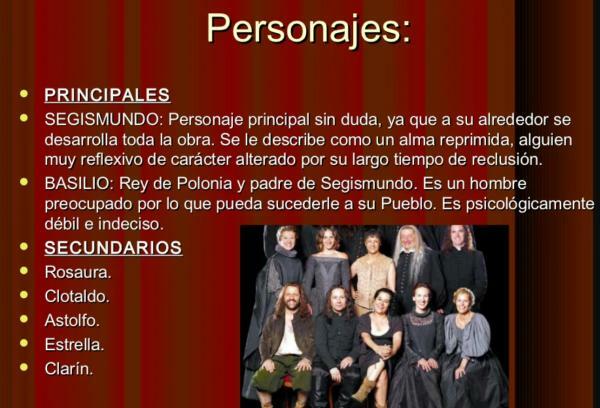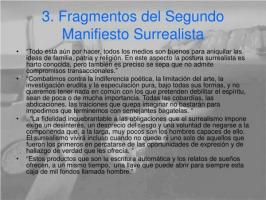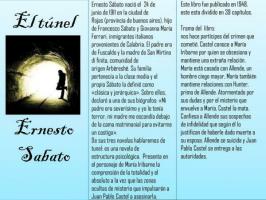CHARACTERS of Life is a dream by Calderón
Now that we have established the role of characters In the structure of the work in general, we will delve into each one of them individually:
Sigismund
Crown prince to the throne of Poland, albeit unknowingly, because he has been locked since his birth in a tower with the only occasional company from Clotaldo. It is the object of a prophecy that dictated to the king (his father from him) that Sigismund would be a tyrannical and cruel monarch, and that he would end up defeating and humiliating his father, which explains the forced isolation of him.
Definitely the most complex character in the playSigismund goes far beyond his individual role as the hapless prince in history to achieve a powerful symbolic dimension that accompanies the philosophical theme of the work.
Particularly in the first two acts, the wild and beastly character Sigismund's is accentuated and juxtaposed to a humanity that has been taken from him by taking his freedom: Sigismund is described as a "human monster", or "a man of beasts / and a beast of men" (day I, scene 2). This is the result of his isolation that makes him find himself in a situation even inferior to the animal and out of the natural, but it is also a clear
allusion to the Greco-Roman myth of the minotaur, a half-bull half-man monster who was locked in a labyrinth, isolating him from the outside world.Another classic inspiration for the situation of our protagonist is that of the myth of the cave of the philosopher Plato. Briefly summarized, Plato gives the example of a group of prisoners chained in a cave. Behind him is a fire, and objects that pass in front of the firelight and are reflected on the wall in front of the prisoners. They can only see the shadows of the objects on the wall, and therefore the shadows (and not the object) are the reality for them. The philosopher is one who manages to escape the cave and see clearly. Like Plato's prisoners, Sigismund also begins locked in his limited world, but he manages to escape the tower and reach the truth despite a confusing reality.
Sigismund's situation and clothing also clashes with his status as a prince. Some critics have seen in his representation not only the will to tell the concrete story of Sigismund, but also a story universal - hidden between the lines - del human being in general. Her wild, primitive and pagan beginnings will be replaced by the virtue and magnanimity of the Christian. Her transformation is most obvious in her monologue at the end of the second act, and throughout the third act or denouement, but the reader / viewer can intuit of her and some indications of her in hers first meeting of her with Rosaura, which will provide some light in her labyrinth, appealing to her more human feelings about her.
Rosaura
She is the daughter of Clotaldo (she unknowingly), she travels from Moscovia (Russia) to Poland to take revenge on Astolfo, who has caused her disgrace by abandoning her to succeed the Polish throne. Rosaura is brave, independent and determined to get what she wants above all else.
There are several similarities and parallels between Rosaura and Sigismund that help to intertwine the two intrigues even more, and give depth to the two characters. The two abandoned by their parents, disgraced by other people, and unhappy, Rosaura and Sigismund find a feeling of themselves.solidarity in suffering and misery of the other from the beginning. The two can resolve their conflicts thanks to the other: Rosaura's story makes Sigismund understand that not everything has been a dream (and yet leads him to choose the good anyway), and only thanks to Sigismund's triumph, is Rosaura able to restore his honor without having to kill Astolfo.
Although his story has the appearance of a swashbuckling comedy intrigue, with the typical themes of love affairs and honor, the parallels between Rosaura and Sigismund, as well as the role that the two play in the intrigues of the other give Rosaura an outstanding importance also in the philosophical character of the construction site.
Basil
King of Poland seeking a successor to the throne. His name, Basilio, comes from the Greek basileus, which also means "king." Uncle of Astolfo and Estrella, and father of Sigismund. Defying the "stars" or fate (the prophecy), Basilio he becomes a cruel tyrant himself in locking his own son in a tower to avoid his transformation into a cruel tyrant. More or less directly, Basilio is the cause of all misfortunes history, the most obvious being his treatment of Sigismund, but it is also an indirect cause of Rosaura's disgrace, since Astolfo abandons the girl in order to marry Estrella and access the throne (a throne that would not be his if Sigismund had not been locked).
Basil force his own misfortune by not believing neither in the power of Providence (he tries to avoid the prophecy by locking up his son) nor in free will (he does not believe enough in the freedom of man to choose his destiny). From him, humanity deprives his son by depriving him of freedom.
its final regret he earns her forgiveness, but the gesture of a king prostrating himself before a magnanimous Sigismund is still significant. However, Calderón is far from seeking to criticize the monarchy through this character, as made clear in the final punishment of the soldier who betrayed the monarchical power.
Clotaldo
Faithful servant of the king and father (secret) of Rosaura, Clotaldo guards the tower where Sigismund is imprisoned, and he is the only person that the protagonist has seen throughout his life. Clotaldo is the supporting character who most clearly serves as one of the many points of connection between Sigismund's main intrigue and Rosaura's secondary. This is also reflected in the constant dilemmas that the character must face, mainly between his loyalty to the king, and his feeling of responsibility towards his daughter.
Astolfo
Duke of Moldovia who arrives in Poland to be able to opt for the throne by marrying Estrella. His participation in the Rosaura-Astolfo-Estrella love triangle could make him seem on the surface the typical figure of the young lover in a sitcom, but his involvement in the succession plot gives her an interest additional. Astolfo it does not move mainly for loveof her, but for her lust for power, of her that they have made him abandon her beloved (causing her disgrace), and prepare to marry Estrella and get the throne. The portrait of Rosaura that she wears on her chest shows her love still present for the girl, but it should be noted that it is not until Clotaldo reveals to be her father, thus restoring Rosaura's honor and proving her noble origins, that Astolfo agrees to marry she.
Star
Niece to the king and cousin to Astolfo, Estrella also has ambitions to access the Polish throne through a marriage to Astolfo. Although Estrella does not show signs of true love towards Astolfo and the union is strategic to achieve the power, the envy of him caused by the portrait of another woman that Astolfo carries causes the meeting between the two lovers. His final marriage with Sigismund is also strategic, but in this way he manages to tie up all the ends of the most intrigue. similar to baroque comedies (often terminated by several pairings), and also ensures access to the can.
Clarion
Described as "The funny one", Clarín is the most typically comic character of The life is dream. Rosaura's servant, Clarín accompanies her to Poland making comical comments in more or less serious scenes. Clarin's traits are all characteristic of a servant of baroque comedy, funny, cowardly, and without a sense of honor. Even so, his character is innovative in the sense that it is not found in a strictly comic work, and most of the comic weight that counteracts tragic and philosophical themes falls on him.
Not only this, but also Clarín is the only character (except the soldier) that has a truly tragic ending. Although peculiar, his death helps Basilio finally recognize his mistakes. Witnessing the accidental death of Clarín, the king pronounces the following words: "Look that you are going to die, / if it is of God that you die." Basilio thus recognizes the power of destiny and his mistake in wanting to avoid what should be.




